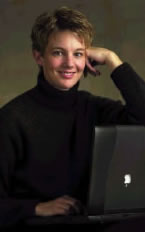
On
Humility
by Theresa Desmond, editor
This
past summer, I participated in a continuing education course on higher
education leadership, the final session of which was taught by Jack Newell,
former dean of liberal education at the U and current president of Deep
Springs College. When he asked the class to list our core beliefs, in
conjunction with our beliefs about the aims of higher education, I was
surprised to find that one of the things I wrote was “humility.”
I thought about that answer as this issue of Continuum took shape. When I wrote “humility,” I was thinking that our higher education efforts are often spent in the process learning—learning to understand, to be creative, to be responsible, to make better. We are almost surely humbled by that process. There is so much to know before we can even ask the right questions, and the setbacks on the path to the answers can be equally daunting.
But it’s also easy to
be fooled into thinking that we’ve accumulated quite a bit of knowledge
and that the answers are obvious. In a time when information seems so
plentiful and arrives so quickly, we can become impatient with slow, indefinite
answers; we can begin to think that “understanding” is simply
a process of absorbing, barely, CNN-like multi-screen tidbits. We might
sacrifice depth for easy irony. We might substitute individual experiences
or personal reactions for analysis and careful thought. And then, it’s
a small leap to thinking that surely we could find solutions to parking
problems, run a complex admissions process at a medical school, write
a book, or design an undergraduate curriculum—so why can’t others?
It’s refreshing to encounter those at the University and in our communities who approach learning as learners—that is, with an assumption that they might not have all the answers, that questions should be considered from many angles, that insights might come from a place of openness, not cynicism. Fortunately, the U has its share of such people: committees that pool resources to bring speakers and their ideas to campus, discussion groups that voluntarily review policies, individuals who keep asking “What if…?” I think about what Dean Li, an associate professor of internal medicine, suggested in a previous issue of the magazine as his motivation in research and teaching: “I aspire to be more like [my kids]. They are fearless. Despite all their insecurities, they jump off anyway….They are aggressively trying to change who they are….They never stop asking questions.” This is not to suggest that confidence and chutzpah don’t have their place. To even ask questions reveals a certain arrogance—who are we to think we can know what seems unknowable, to disturb the universe? But asked with a desire to learn and change and reconsider, those questions can have as their goal a respect for the people and places around us, a sense that we are connected and fragile and quite capable of error.
In this issue of Continuum, we’ve found some people who embody that desire and lack of pretension. We learn, as writer Lee Siegel notes, that “in academia, where titles and honors sometimes stuff shirts to the bursting point,” Frank Brown, dean of the College of Mines and Earth Sciences and the recipient of the 2001 Rosenblatt Prize for Excellence, “stands out as an exemplar of humility.” Writer Mike Arnow tells a story of one determined—and open-minded—anthropology student and her simple desire to know more about Arabs living in Israel, reaching beyond stereotypical assumptions about the Middle East.
Humility is also embodied in people like the physician assistants in this issue who treat each patient as an individual deserving their full concentration and humanity, and in our own alumni, whose community service efforts help ensure that the needs of our neighbors are not forgotten.
And by looking at some of
the issues facing the Paralympics and Paralympians today, Phil Sahm reminds
us that beneath all of the tiresome details of the Games are the tenacity
and spirit of athletes who, forced to re-examine themselves at their core,
go beyond what was thought possible.
The people in the following pages—from Coach Greg Marsden to our
University Street neighbors—remind me of the line in Bob Dylan’s
“My Back Pages”: “I was so much older then; I’m younger
than that now.” Perhaps they know that experience brings humility
and a kind of rebirth, an ability to see the world with fresh eyes. Jack
Newell probably knew that when he asked our class to question our core
beliefs. At least I think so. What do I know?
